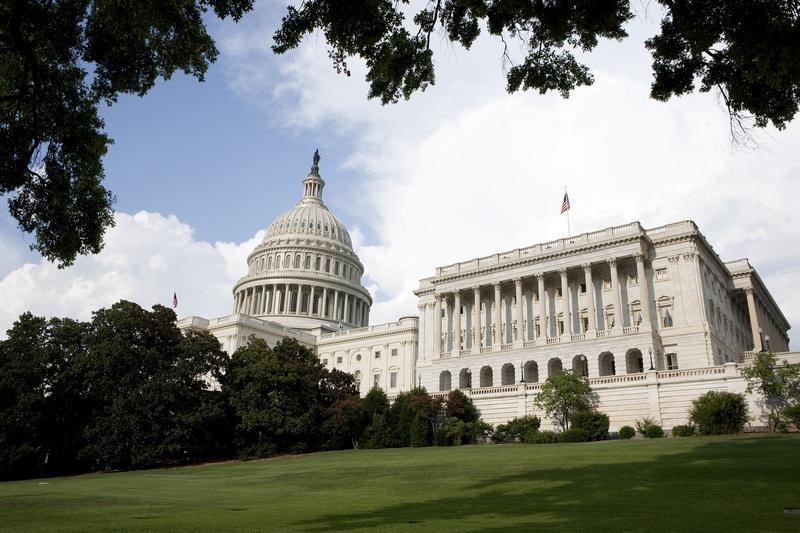By Jonathan Allen and Joseph Ax
(Reuters) - Even as the presidential election dominates the country's attention, Democrats have spent record-breaking sums this year on winning seats in state legislatures, 10 years after a Republican wave gave that party the power to reshape U.S. congressional maps.
Democrats have poured tens of millions of dollars into state-level contests to oust Republican lawmakers ahead of 2021, when state legislatures will draw new boundaries for U.S. congressional districts in many states. The redistricting follows this year's decennial U.S. census, the results of which will determine how many seats each state gets in the U.S. House of Representatives.
For both the Democratic and Republican parties, the fiercest fight, and the biggest prize in next Tuesday's elections, is in Texas, which stands to gain two to three additional seats in the U.S. House.
The 2010 elections, which followed the last census, gave Republicans control of 20 additional state legislative chambers and six additional governors' mansions.
In many instances, their control allowed them to draw strangely shaped congressional districts dividing up voters for an electoral advantage, a practice known as gerrymandering. That in turn helped the Republicans gain a 33-seat majority in the U.S. House in the next 2012 election, despite Democrats winning the overall popular vote in those races.
Partisan gerrymandering is largely permitted under the law. In 2019, the U.S. Supreme Court ruled that federal courts had no authority to strike down gerrymandered maps, though state courts are still free to examine them under state law.
Jessica Post recalls how, as a junior Democratic staffer on election night in 2010, she vowed over a beer in a Pennsylvania bar that she would not let the Republicans outmaneuver her again.
"This has been a decade in the making for us," said Post, now the president of the Democratic Legislative Campaign Committee (DLCC), the party's main group devoted to winning statehouse elections. "He who controls redistricting controls Congress."
Redistricting varies from state to state: seven states, including Wyoming and Montana, are so sparsely populated they have only one seat in the House. A minority of states have empowered independent commissions to draw districts' boundaries. In some three dozen states, the mapping largely falls to state lawmakers, with some of those states awarding the governor veto power.
Democrats are aiming to claw back territory by capitalizing on the so-called "Blue Wave" of 2018's elections, when the party regained control of the U.S. House. It also sees the unpopularity of President Donald Trump in corners of some competitive states as a weakness for other Republicans on the ballot.
The party has already flipped 10 state legislative chambers since Trump, a Republican, took office and has designs on several more on Nov. 3.
Post's organization is focused on a few dozen statehouse races in eight states, including presidential battlegrounds Arizona, North Carolina, Michigan, Pennsylvania and Texas, spending $50 million on advertising, training and in direct contributions to campaigns, compared to about $10 million in 2010.
In some states, such as Arizona, Democrats are trying to end total Republican control of state government by taking back either the governor's mansion or the state legislature. In other states, such as North Carolina, with a Democratic governor, the party aims to take complete power.
Although the DLCC has raised money more than ever, its Republican counterpart, the Republican State Leadership Committee (RSLC), is still outraising them, with $65 million earmarked in a dozen target states, more than twice as much than in 2010.
In many instances, the RSLC is fighting to defend existing Republican strongholds, though the group's president, Austin Chambers, sees some currently Democratic turf up for grabs, including the Alaska House of Representatives.
A repeat of 2010's blowout, however, seems unlikely to Chambers, if only because Democrats no longer seem to be unprepared.
This year, he said, "you've got Democrats who have woken up and realized there's this thing out there called state legislatures."
EVERYTHING'S BIGGER IN TEXAS
Texas is one of 21 Republican "trifecta" states, in which the party controls both chambers of the legislature and the governorship. The Democrats have only 15 trifecta states.
Though far from a shoo-in, Democrats think they can seize control next week of the nine seats they need to take control of the Texas House of Representatives, giving them a say in how the new maps are drawn and influence over state law and policy.
The party is focusing on competitive seats in the demographically diversifying suburbs of Houston and Dallas. In those areas, it sees Republican support softening thanks to younger, more racially diverse voters repelled by Trump's policies and his handling of the world's deadliest coronavirus outbreak.
Chambers said Republican candidates are strongest when they make their campaigns about local issues rather than a referendum on Trump, but agrees that Texas is the biggest priority.
"The battle for the Texas House is absolutely a dog fight," he said.
Mark Jones, a political science professor at Rice University in Houston, said Democrats have somewhere between a 1-in-3 and a 2-in-5 chance of flipping the 150-member Texas House of Representatives.
But the ripples from such a victory could be huge: A Democratic House could force the Texas court system to intervene and order less gerrymandered maps. Jones said that six currently Republican congressional districts under Texas's gerrymandered map could flip to Democratic control under a neutral map.

"Trump is just pulling every Republican down," Jones said. "He's like a lead weight tied around every Republican's waist, and they're struggling to stay above the water line."
